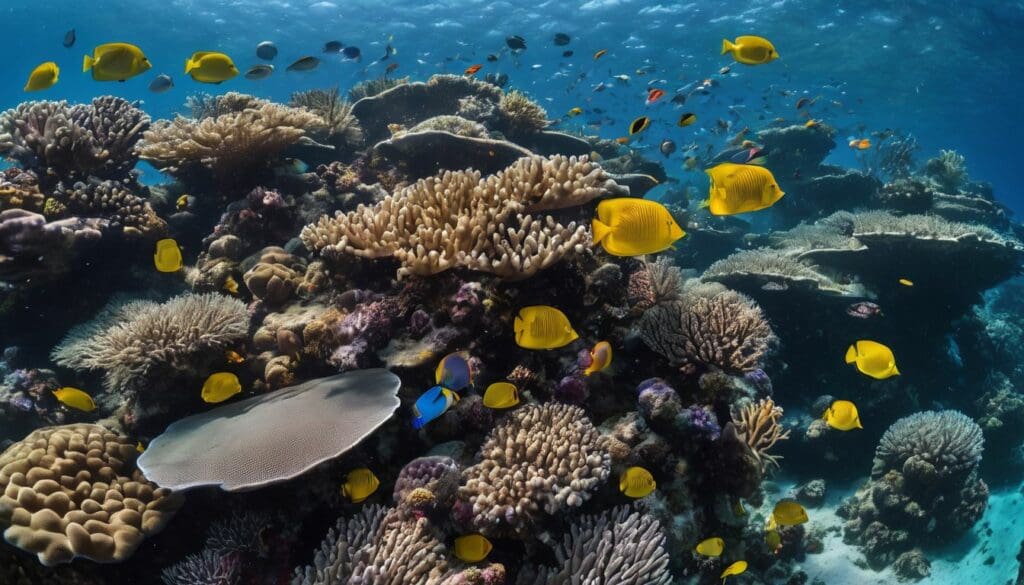Navigating the delicate balance between savouring mouth-watering seafood and preserving our ocean’s wellbeing can certainly feel like quite the conundrum. We’ve wrestled with this very issue but have been heartened to find that sustainable seafood holds the answer, marrying a cornucopia of nutritional benefits with a clear conscience for marine life.
Within this post, we’ll take you by the hand and show you how it’s possible to delight in those sumptuous health rewards while simultaneously contributing positively to aquatic conservation efforts.
So, shall we cast off into the enthralling waters of sustainable seafood together?.
Key Takeaways
- Sustainable seafood is packed with essential nutrients, including high-quality protein and omega-3 fatty acids beneficial for heart health and brain function.
- Choosing sustainable seafood supports the long – term health of ocean ecosystems, aiding in the preservation of marine life and habitats.
- Opting for MSC – certified seafood ensures that you are consuming fish from sources that have been verified for their sustainable practices.
- Including affordable options like tinned or frozen fish can make eating sustainably-sourced seafood easier on your budget while still providing health benefits.
- By prioritising sustainable seafood, we help reduce carbon emissions associated with overfishing and support local economies dependent on responsible fishing practices.
What is Sustainable Seafood?
Sustainable seafood refers to fish and shellfish that are caught or farmed in a way that ensures the long-term health and stability of ocean ecosystems. By supporting sustainable practices, we can help protect marine life and ensure a healthy future for our oceans.
Definition
Sustainable seafood comes from sources that maintain or increase the health of our oceans’ ecosystems while also ensuring the long-term viability of fish populations. We look for fishing practices that minimise environmental impact and promote ocean sustainability.
This type of seafood is caught or farmed in ways that consider the vitality of marine life and habitats, allowing us to enjoy nutritious seafood without depleting resources.
Choosing ethically sourced fish not only helps preserve marine conservation but also guarantees fair working conditions for those in the industry. By prioritising these methods, we support local economies and contribute to an overall healthier planet.
Our actions lead the way towards more efficient protein sources that are rich in essential omega fatty acids, promoting healthy eating both now and for future generations.
Importance of supporting sustainable practices
Supporting sustainable practices in the seafood industry is crucial for safeguarding the health of our oceans and ensuring a steady supply of nutritious, high-quality protein. By choosing sustainably sourced seafood, we actively contribute to the preservation of ocean health and biodiversity while reducing the environmental impact of fishing.
This not only benefits us but also supports local economies that depend on responsible fishing practices. Through our conscious choices, we can promote ethical seafood sourcing, ensuring a healthier planet for ourselves and future generations.
Moreover, by opting for sustainable seafood options rich in omega-3 fatty acids, essential vitamins, and minerals, we address nutrient deficiencies and contribute to better overall health.
High-quality marine sources contain nutrients vital for human well-being without contributing to micronutrient voids or harmful environmental practices. Embracing sustainable seafood empowers us to cherish our environment while benefiting from its abundance.
The Health Benefits of Sustainable Seafood
Sustainable seafood is a high-quality protein source that contains essential omega-3 fatty acids, which are beneficial for heart health and brain function. It also provides essential vitamins and minerals, making it a nutritious addition to any diet.
High-quality protein source
Sustainable seafood provides our bodies with a high-quality protein source, aiding in muscle growth and repair. It offers essential amino acids necessary for a balanced diet, promoting overall well-being.
This lean protein option helps to maintain healthy bones and supports the immune system, contributing to an active lifestyle and good health.
Additionally, sustainable seafood is rich in omega-3 fatty acids which play a crucial role in brain function and heart health. These healthy fats are known to lower the risk of cardiovascular disease while also reducing inflammation within the body.
Rich in omega-3 fatty acids
In addition to being a high-quality protein source, sustainable seafood is rich in omega-3 fatty acids. These essential fatty acids play a vital role in supporting heart health, reducing inflammation, and promoting brain function.
Incorporating sustainable seafood into your diet can provide you with the recommended intake of omega-3s, contributing to overall well-being and improved health outcomes.
Furthermore, the omega-3 fatty acids found in sustainable seafood are known for their positive impact on mental health and cognitive function. Regular consumption of these essential fats has been linked to lower rates of depression and anxiety, making them an important component of a balanced and healthy diet.
Essential vitamins and minerals
- Omega – 3 fatty acids, which support heart health, reduce inflammation, and promote brain function.
- Vitamin D, crucial for bone health, immune function, and mood regulation.
- Vitamin B12, essential for nerve function and the production of DNA.
- Iron, important for transporting oxygen throughout the body and preventing anaemia.
- Selenium, a powerful antioxidant that supports thyroid function and may reduce the risk of certain cancers.
- Zinc, vital for immune system function and wound healing.
Environmental Benefits of Sustainable Seafood
Supporting sustainable seafood practices not only benefits our health, but also contributes to the preservation of ocean health and reduces carbon emissions. By choosing sustainably sourced seafood, we can support local economies and ensure a healthier planet for future generations.
Preservation of ocean health
Sustainable seafood practices play a crucial role in preserving ocean health. By supporting sustainable fishing methods, we help maintain the delicate balance of marine ecosystems and protect against overfishing.
This sustenance of ocean health is essential for the longevity of diverse marine life forms and their habitats, ensuring a thriving environment for future generations.
Choosing sustainable seafood options supports the conservation efforts aimed at preserving our oceans’ delicate ecosystems. Through mindful selection and consumption, we contribute to creating a healthier ocean environment while enjoying the nutritional benefits that sustainable seafood has to offer.
Reduced carbon emissions
Choosing sustainable seafood is not only beneficial for our health but also helps reduce carbon emissions. By opting for sustainably caught or farmed seafood, we support practices that have a lower environmental impact.
Sustainable fishing methods such as hook and line or traps produce fewer carbon emissions than large-scale industrial trawling. Additionally, choosing species that are abundant helps to preserve marine biodiversity and reduces the need for excessive fishing, which in turn decreases carbon emissions associated with overfishing.
Support of local economies
Choosing sustainable seafood not only benefits our personal health and the environment but also plays a vital role in supporting local economies. When we opt for sustainably sourced seafood, we contribute to the livelihoods of fishermen, coastal communities, and small-scale businesses that rely on healthy oceans.
By prioritising sustainable fishing practices, we create economic opportunities for those who depend on the sea for their income and help ensure the longevity of these industries.
When consumers actively seek out sustainable seafood options, they drive demand for responsible fishing practices which motivates businesses to invest in environmentally efficient methods that ultimately benefit both local economies and ocean conservation efforts.
How to Incorporate Sustainable Seafood into Your Diet
Look for MSC certification when purchasing seafood, consider affordable options like canned or frozen sustainable fish, and explore different recipes to enjoy the health benefits of sustainable seafood.
To learn more about incorporating sustainable seafood into your diet, read the full blog post.
Look for MSC certification
When selecting sustainable seafood, we recommend looking for products with the Marine Stewardship Council (MSC) certification. This label ensures that the fish or seafood you are buying comes from a certified well-managed fishery, which meets strict standards for sustainability.
By choosing MSC-certified options, you support ocean health and biodiversity while enjoying the health benefits of consuming high-quality protein and omega-3 fatty acids.
To ensure that your seafood consumption aligns with your environmental values and supports responsible fishing practices, it’s important to look for the MSC certification when making purchasing decisions.
Affordable options
Looking for affordable options to incorporate sustainable seafood into your diet? Consider choosing small, oily fish such as sardines, mackerel, or anchovies. These types of fish are not only budget-friendly but also packed with omega-3 fatty acids and essential nutrients.
Canned or frozen sustainable seafood is another cost-effective choice that provides the same health benefits as fresh options. Look for promotions at your local fish market or supermarkets and stock up when there are discounts available.
If you’re on a tight budget, consider purchasing seafood from local fishermen’s markets where you can find freshly caught sustainable varieties at competitive prices. Additionally, opting for less popular species of fish that are abundant in the oceans can be an economical and eco-conscious choice.
Options for enjoying sustainable seafood
Conclusion
In conclusion, sustainable seafood offers numerous health benefits. It provides high-quality protein, rich in omega-3 fatty acids, and essential vitamins and minerals. Incorporating sustainable seafood into your diet supports both ocean health and your own well-being.
Making informed choices can lead to a healthier lifestyle while also supporting conservation efforts.
FAQs
1. What are the health benefits of eating sustainable seafood?
Sustainable seafood is rich in healthy proteins and omega fatty acids, which are essential for maintaining good overall health.
2. How does choosing sustainable seafood help our oceans?
By selecting sustainable seafood, you support environmental efficiency and contribute to keeping ocean ecosystems healthy.
3. Can eating fish oil really improve my health?
Yes, the omega fatty acids in fish oil can boost your heart health and have other beneficial effects on your body.
4. Is sustainable protein from seafood better than other proteins?
Sustainable protein from seafood is considered environmentally efficient as it has a lower carbon footprint than many land-based sources of protein while also providing key nutrients.





